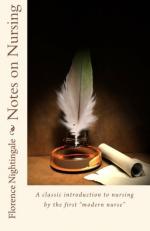To attempt to keep a ward warm at the expense of making the sick repeatedly breathe their own hot, humid, putrescing atmosphere is a certain way to delay recovery or to destroy life.
[Sidenote: Bedrooms almost universally foul.]
Do you ever go into the bed-rooms of any persons of any class, whether they contain one, two, or twenty people, whether they hold sick or well, at night, or before the windows are opened in the morning, and ever find the air anything but unwholesomely close and foul? And why should it be so? And of how much importance it is that it should not be so? During sleep, the human body, even when in health, is far more injured by the influence of foul air than when awake. Why can’t you keep the air all night, then, as pure as the air without in the rooms you sleep in? But for this, you must have sufficient outlet for the impure air you make yourselves to go out; sufficient inlet for the pure air from without to come in. You must have open chimneys, open windows, or ventilators; no close curtains round your beds; no shutters or curtains to your windows, none of the contrivances by which you undermine your own health or destroy the chances of recovery of your sick.[3]
[Sidenote: When warmth must be most carefully looked to.]
A careful nurse will keep a constant watch over her sick, especially weak, protracted, and collapsed cases, to guard against the effects of the loss of vital heat by the patient himself. In certain diseased states much less heat is produced than in health; and there is a constant tendency to the decline and ultimate extinction of the vital powers by the call made upon them to sustain the heat of the body. Cases where this occurs should be watched with the greatest care from hour to hour, I had almost said from minute to minute. The feet and legs should be examined by the hand from time to time, and whenever a tendency to chilling is discovered, hot bottles, hot bricks, or warm flannels, with some warm drink, should be made use of until the temperature is restored. The fire should be, if necessary, replenished. Patients are frequently lost in the latter stages of disease from want of attention to such simple precautions. The nurse may be trusting to the patient’s diet, or to his medicine, or to the occasional dose of stimulant which she is directed to give him, while the patient is all the while sinking from want of a little external warmth. Such cases happen at all times, even during the height of summer. This fatal chill is most apt to occur towards early morning at the period of the lowest temperature of the twenty-four hours, and at the time when the effect of the preceding day’s diets is exhausted.
Generally speaking, you may expect that weak patients will suffer cold much more in the morning than in the evening. The vital powers are much lower. If they are feverish at night, with burning hands and feet, they are almost sure to be chilly and shivering in the morning. But nurses are very fond of heating the foot-warmer at night, and of neglecting it in the morning, when they are busy. I should reverse the matter.




